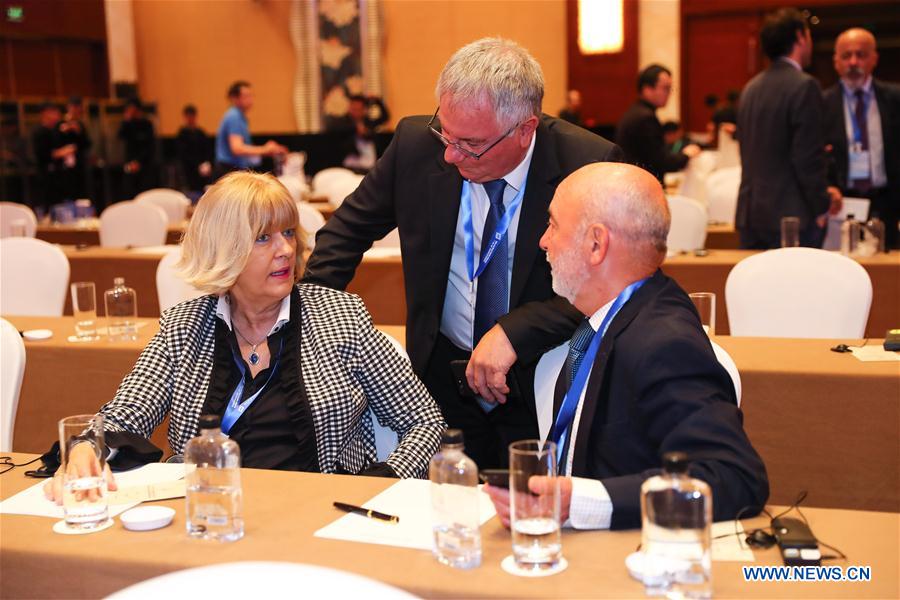BRSN: Fresh result of Belt and Road Initiative
- By George N. Tzogopoulos
 0 Comment(s)
0 Comment(s) Print
Print E-mail China.org.cn, April 26, 2019
E-mail China.org.cn, April 26, 2019

The second Belt and Road Forum for International Cooperation (BRF) has opened in Beijing with important thematic sessions. Meanwhile, a meeting of representatives of universities, research centers and think tanks demonstrates the Belt and Road Initiative (BRI) has become of special interest for global scholarship.
The first annual meeting of the Belt and Road Studies Network (BRSN) that took place on April 24 highlights moves towards coordinated actions and establishment of a joint platform for research collaboration. In particular, the BRSN will be an open mechanism of academic exchange offering an opportunity to share ideas and disseminate research findings.
The official website was launched at the same time to inform interested parties about the organizational structure and potential publications and activities of the platform.
In May 2017, President Xi Jinping, addressing at the first BRF, said, "Think tanks should play a better role and efforts should be made to establish networks and partnerships." The establishment of the BRSN two years later is a definite step in that direction.
Knowledge is critical to better understand what the BRI stands for and how win-win results can be produced. Excellent proposals by scholars could be financed by a Belt and Road research fund operating within the context of a new non-profit foundation. Researchers from numerous countries – especially developing ones – might subsequently receive grants and cooperate with Chinese colleagues if the quality of their applications is acceptable.
In a period when misconceptions about China dominate the Western public sphere, the BRSN offers a creative approach to setting the record straight. Representatives of several Chinese think tanks have already talked about the necessity of "theoretical innovation."
This could contribute to creation of new analytical frameworks to better explain the BRI. The Initiative itself is original so that existing frameworks do not always suffice in this regard. Terms such as "a community of shared future for the humanity," for example, require further academic analysis in order for scholars, especially those in the West, to fully understand their meaning.
Yet, theoretical knowledge should not only be an affair for elites and the cognoscenti. Speakers in the first annual meeting of BRSN agreed that theory had to be linked to and be followed by practice.
This is the role think tanks and research organizations play in the scheme of things. However, even universities cannot any longer rely only on theoretical approaches that lack real contact with day-to-day politics and economics.

Their responsibility should be to equip students with efficient qualifications and quickly respond to learning challenges in the current era of globalization. The speed in sharing information and the power of the Internet require an immediate adjustment of old practices to new conditions.
Hence, universities, research centers and think tanks could undertake a double mission in relation to realization of the BRI.
First, they should be active in advising governments and facilitate policy-making. Politicians do often rely on accurate research findings in order to proceed with important decisions. Second, it is essential for universities, research centers and think tanks to have a stronger voice in national and international media.
Long papers might be outstanding in terms of academic quality and deep research, but they can never really hope to appeal to general public opinion. Ordinary citizens need short analyses that provide answers to their questions about the current meaning of politics and economics.
In the modern era, professors, scholars and researchers will be more successful if their work is accompanied by the ability to lead public opinion and limit misinformation that is spreading. The BRSN is certainly endeavoring to lead that movement.
On the very day the first annual meeting of BRSN was organized in Beijing, the English and French editions of a compilation of President Xi Jinping's discourses on the Belt and Road Initiative were published.
This is a new source for existing and new partners of the Network to better assess the BRI. Although the Initiative extends far beyond China and affects all continents in sharing prosperity, it is impossible to understand what is involved without reading the work of its initiator.
George N. Tzogopoulos is a columnist with China.org.cn. For more information please visit:
http://www.china.org.cn/opinion/GeorgeNTzogopoulos.htm
Opinion articles reflect the views of their authors, not necessarily those of China.org.cn.
If you would like to contribute, please contact us at opinion@china.org.cn.






Go to Forum >>0 Comment(s)